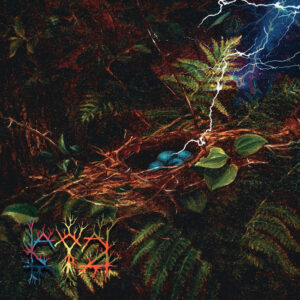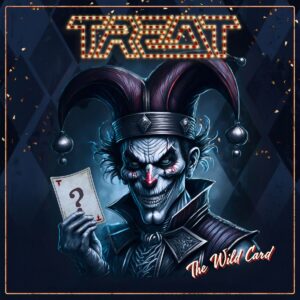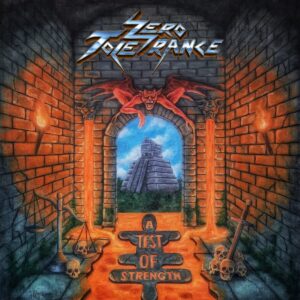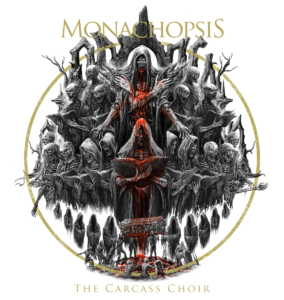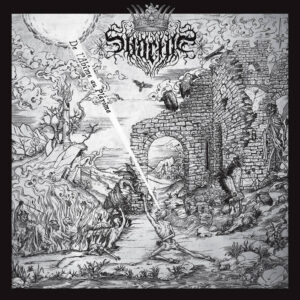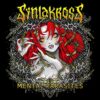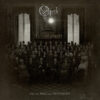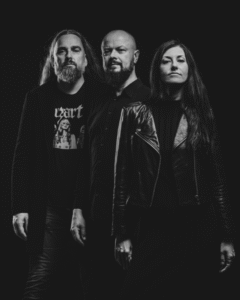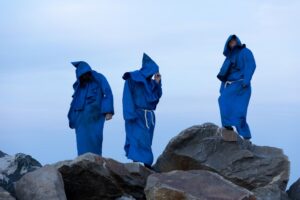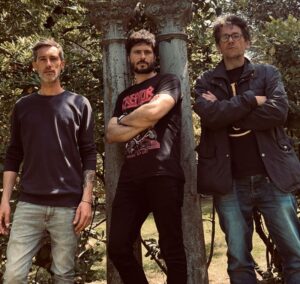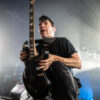Freyja's Song
Skorum
•
January 12, 2021
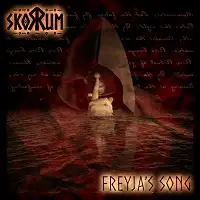
If there was even an album that had a singular purpose, it is SKORUM's "Freyja's Song." The band's name means "I Invoke" in Old Norse, and the themes here are fitting since where the band is from, the Outer Hebrides (off the west coast of Scotland), were part of the Norse kingdom for over 400 years. The album is described in the band bio as "an invocation and devotional to the Vanir Goddess Freyja and focuses on the legends as told in the Poetic and Prose Edda" (Vanir, by the way, are "the race of gods responsible for wealth, fertility, and commerce"; the Poetic Edda is a collection of Old Norse poems by an anonymous author, while the Prose Edda was written by Snorri Sturluson).
(An interesting aside – Martin is also the author of the horror/fantasy series "The Spirals of Danu.") So now that we've got our background, on to the music, although these are not necessarily "songs," per se, but actual prayers and invocations, exactly as advertised – otherworldly, primitive, and sparse. There are "verses" and "choruses," but not in the traditional sense; they are more mantras, calls, indeed devotionals. They are one-dimensional, perhaps, but in being so, they serve the purpose for which they were likely created.
"Hallowed" begins with droning, sounds of nature (thunder, birdsong), and primitive percussion. Martin's hoarse, almost spoken, atonal chant-singing is intimately mixed in your ears, maybe a little too much so. His vocals go against the rhythm in a weird way – it seems intentional and it might be a bit jarring, but again these aren't really supposed to be "songs." His voice is vaguely uncomfortable to listen to since it's so unchanging and monotonic – he's definitely not a singer – he's acting more as a priest, so singing is not necessarily what's required for this material. Think of what JIM MORRISON used to do with THE DOORS and that gives you some idea of what's going on here.
This is asking for the goddess' presence in this ritual (the urgent request to "rise") that sets the stage for the "service," as it were ("Every word that we cry, she'll take," she'll listen), assuring that "by the hammer, hallowed" (that is, Thor's hammer), it is a proper rite. The acknowledgment of the directions (north, south, east, west), the "wights" (the spirits), the "ancients" (the ancestors), the "sons" (those to come), and the "Orlog" (rather like fate or karma, "the primal law of all existence") fleshes out the ceremony depicted here.
"Rise" is very primitive, as it would have sounded thousands of years ago, and the production echoes it, it's very raw, very echoing. Martin mentions the "Vanir rites," then "A Seidr state" (that's a type of Norse magic that deals with telling and shaping the future). The repeated chant "Vanadis, the earth/Vanadis, the air/Vanadis, the fire/Vanadis, the water" is of course the elements, and "Vanadis" is another name for Freyja that acknowledges her role as the goddess of love and beauty (indeed he says later, "As my lover stalks the night"). The line, "let the falcon fly free" is a reference to the cloak of falcon feathers she wears. The chorus is an urgent call to the goddess to come. The repetition of the "Vanadis" lines is done a bit too many times, but then again, if you're invoking her, I suppose you need to show urgency and that fervent hope that she will answer.
"Calling," with its more urgent tempo, is speaking to her followers, the ones gathered at this rite, asking if they are believers, basically (Martin insists, "can you hear her," "can you feel her") and saying we are lost without her ("We dark arisen/On muted shores/With nowhere we can call home"). The female vocal very faintly as an echo, personifying the goddess' voice (we'll get her actual voice later).
"Burn" is even more sparse, with percussion only and Martin's almost breathless speak-singing. It might be talking about the burn of lust, since Freyja is the goddess of love and sexuality, but it also may be a reference to the burn of the funeral pyre (she is also a goddess of the slain, being in charge of half of those who die in battle). Perhaps this is a fallen warrior seeing his end ("I can't breathe" and "My heart against her chest/In her promise forever rest" and "I fear nothing" and "I'm dying, from treason"). He says, "Father I barely know you/She raises me now," as if to say he is going to be with her and not Odin. The reference to "autumn" is also one of fertility, the reaping of the harvest – perhaps to the reaping of souls in this case – and "Burn for all of Vanaheim" could mean a yearning for that location, which is where the Vanir gods lived, for his soul to go there.
The title track – percussion, more wafts of vague programming sounds – begins with Martin calling for "Muna," or "mother." The whole track is a yearning for the spiritual. The line, "Forgetting all of Tyr's desires" refers to the god of war and justice, so perhaps the line refers to focusing not on war but on what the goddess wants. The line, "Prophecy smiles through her volva eyes" (a volva is a seeress) ties in with the line. "Seidr's song remains here," like we are looking for prophecy, for insight. The rest of the lyrics draw on more than just the Norse, blending different spiritual elements together – "As we dive into ishvara tonight," ishvara being the Hindu concept of a higher power; "Promise Thule delivers," Thule meaning "a place beyond the borders of the known world"; "Forget the keys of Memnon," Memnon being an Ethopian king killed by Achilles in the Trojan war; "the works of Sol still shine," Sol being the Roman god of the sun; "psychonauts all adrift in time," psychonautics being "the exploration of the psyche by means of techniques such as lucid dreaming, sensory deprivation, and the use of hallucinogenics"; "quest for gnosis still press on," gnosis being "knowledge of spiritual mysteries." So it's basically a quest for spiritual enlightenment by whatever means necessary, it seems ("Clear the doors of perception/Our thought is all"), although via Freyja as the main conduit.
"Implore" is just a shaker, sounds of water, and light programming, with no percussion at all until the end. This is very spoken by Martin; he vows, "Never to deceive" and says "Wheat and spears are true," as if to say nature (the goddess) and war (perhaps himself) are inevitable. There's not even a melody really until Anna sings, and her voice is beautiful, poignant and tender – she is as much a singer as he is not. Perhaps she serves as Freyja's voice, reassuring that she will be there ("I'll never walk away from you/You're never far from home"). But when the percussion starts, it and her vocal go against each other rhythmically, which here is definitely odd because your ear wants them to mesh.
"The Spirals Of Danu" is a bit more uptempo rhythmically and vaguely sinister. Again, the vocal is at odds with the beat – it's like the recitation of a poem as the rhythm goes on without it, there's no attempt to blend them. Danu is the Irish mother goddess, but it is also an old word meaning "river" and it can refer to several rivers but mainly the Danube (which runs through central and eastern Europe). What is being said here, with that in mind, is unclear though – is he referring to the spiral of "Free from sins/War begins/Hymns set free" (that hints at a cyclical, repeated pattern)? It's one of the more obtuse tracks here.
"Mardoll" (yet another name for Freyja) is built on a bit more instrumentation, with eletronica and shaker joining the percussion. There's still no agreement between the groove and the vocal rhythm, but here it's almost like there's trying to be – Martin seems to be trying to match his "singing" to the tempo. This seems to be depicting the pattern of worship ("Heed the stories of agnation (the line of paternal descent of a family)/Curse all those that we could haunt") and the ecstasy found in it ("All these swelling new sensations" and "This will be the time of elations/If I'm really want you want") and the metaphysical contradictions of perhaps the ceremony itself ("This is a place, that is not a place/This is a time, that is not a time/This is a word, that is not a word/I am the light, that is not a light").
The eerie "Evermore" is chanted to a vague melody set to programming and the shaker; the percussion begins in the "prechorus" and "chorus." It's definitely depicting a death, knowing it is imminent ("Forever calls, burn the doors" and "Like stars, I'm yearning to return" and "The cycles I embraced have burned") and the knowledge that Freyja will ease the witness' grief ("Every tear that you cry, she'll take"). It's as if the dying was urging the witness to let go, especially of the mythology (I'll rise again/Is this fantasy your vanity") and saying, "Still I yearn to be free/From the knoll/In clay all these amber years/So gather away all the scrolls" as if to insist upon ending the mourning process. It mentions the comfort the dying takes in this ritual ("This rite, my life, not blasphemy") and that through "a faith so sheer/I could release control/Into forever."
"Frejya's Song" is not something you'd put on to casually listen to, or perhaps not even something you'd listen to more than once. Whether or not Martin is a true believer in the Norse goddess, this is still a deeply spiritual, deeply personal, and searching project that explores alternate divinity and the transcendental. It is fascinating but unsettling, and it's decidedly unmusical, but perhaps that was the point.
7 / 10
Good
Songwriting
Musicianship
Memorability
Production

"Freyja's Song" Track-listing:
1. Hallowed
2. Rise
3. Calling
4. Burn
5. Freyja's Song
6. Implore
7. The Spirals Of Danu
8. Mardoll
9. Evermore
10. Raise The Stones
Skorum Lineup:
Martin Adil-Smith - Vocals, All Instruments
Samantha Oxborough - Vocals
More results...
